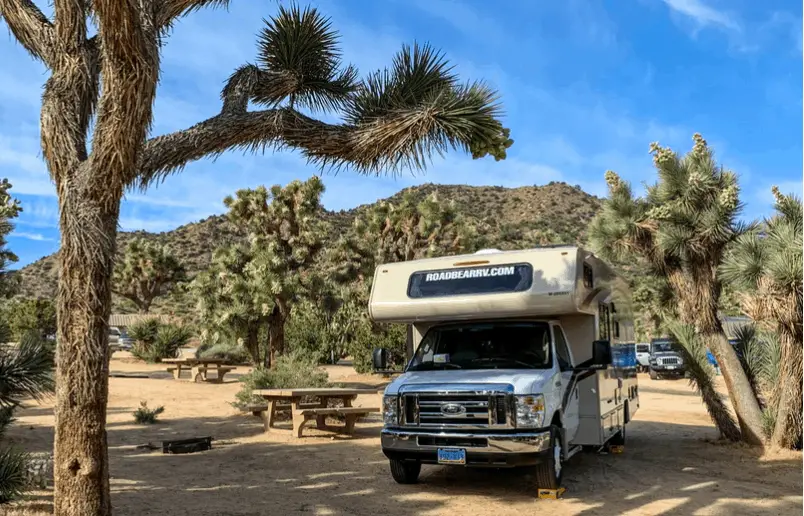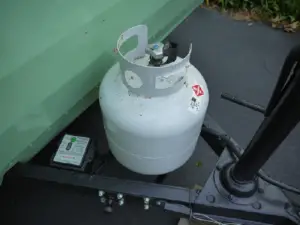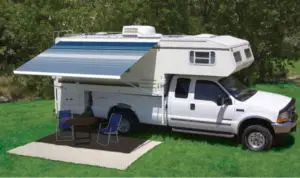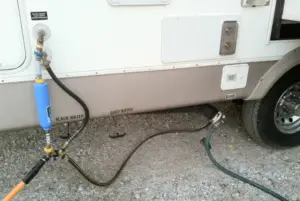It’s a question many new RV owners have, and the answer will change with every different campsite they pull into. If you were to ask ten fellow campers, should RV tires be off ground’?
You will get ten different answers. It seems that everyone has their own opinion on the subject. Also, most of the answers start with “it all depends”.
But, depends on what?
Here are a few situations when it is usually okay to let your RV tires make prolonged contact with the ground, and when it isn’t.
There are two things that can damage your RVs tire when it is stored. First is the UV radiation exposure, and second is the same one position for an extended period of time.
Length of Time
Most RV enthusiasts will agree that leaving your RV tires in contact with the ground will not be a problem short-term. By short term, I mean not more than a couple of weeks, at most.
Its a good idea to take the tires off ground when the RV is in storage for an extended period of time during winter. Now what does it mean by extended period? A good 1 and half months or more can be labelled as an extended period.
Any more than that, and there should be some sort of hard surface between the rubber and the bare earth. Many campers carry sturdy squares of wood or heavy-duty plastic tire mats just for this purpose.
Out of habit, you will see experienced campers using these protective barriers for even one-night stays.
Even on smooth, dry concrete parking surfaces, moisture can become trapped under your tires, leading to deterioration of the tread surface. Placing a vapor barrier under your tires will help, just make sure it doesn’t up’ and hold water.
Leaving your tires to support the entire weight of your RV on a hard surface for an extended period will lead to lat spotting. That means the tire will develop a flat spot that will be noticeable as soon as you hit the highway. Sometimes, the flat spot will fix itself, as the tire warms up.
Other times, as a result of the now squared-off surface making repeated and violent contact with the road surface, it can lead to tire failure. This is especially true with tires that are nearing their end of service life.
The tire manufacturer Goodyear suggests to look over your RV around the block at least once every three months, to avoid developing flat spots and ozone cracking’.
Character of Ground
The surface your tires rest upon will also factor in on your decision to raise the tires off the ground. Concrete or blacktop is best, packed pea gravel is suitable. Avoid gravel parking lots that have sharp-edged aggregate.
Grass or bare earth is the least desirable surface for long-term parking.
Inspect The Ground : A good practice is to pull within a few feet of your spot, get out and inspect the ground directly in front of your tires, then pull forward again.
One pointy rock or root can damage the lies’ (layers of steel belts and polyester materials) of the inner tire, allowing bubbles to form. This will ultimately lead to catastrophic failure of the tire. Consider the drainage of your parking spot when deciding if your RV tires should be off the ground.
If the area floods, even a little, the rubber surface of your tires don’t like to sit in water for extended periods. This can lead to dry rot, another condition that can lead to tire failure.
Use of Leveling Jacks
If you happen to pull into your assigned spot and find it resembles Turn 3 at Daytona, you will need to level your RV. In doing so, when using power auto-levelers, your tires will sometimes leave the ground.
Again, this is okay for short periods of time. But for long-term stays, some other steps should be taken.Tires that are completely off the ground will last forever, but this is not practical.
Some say that the weight of the tires, rims, axle and suspension components were not meant to be hung from the frame by their mounting hardware.
In some rigs, there is a considerable amount of suspension travel from the ‘at rest’ position to a point where the tires lift off the ground.
When this happens, it is a good idea to raise the jacks up past the point of level, place wide blocks under the front wheel, and lower again until the tires just make contact with the blocks.
Read : Why do RVs need to be level?
Check your level again and adjust accordingly. That way, some of the weight is taken off your tires, and the suspension is not carrying the complete load it was designed to.
One thing that RV enthusiasts agree with across the board is that it is NOT O.K. to lift your back wheels completely off the ground! Although there are rear jacks to help level the back end, they should not be run up to their limits to allow the rear wheels to lose contact with the ground.
The rear wheels are connected to the brake system. They are the only thing preventing your RV from becoming a victim of gravity. Should your front jacks sink into the mud, or ice form under the jack surface, the whole rig could lurch forward, causing injury or major damage.
Sidewall Damage
Another danger of your tires having long-term contact with the ground is sidewall damage. Should your tire suffer from a faulty valve stem, or be deflated by Vandals, the sidewall of the tire will be forced into an unnatural shape.
If left in this deflated position long enough, the body plies in the sidewall can separate, and you’ll be on the hook for a new tire.
Best Surface
Getting the right surface for your RV during winter storage is important. Unlike cars or truck, RVs lie idle for more period of time. And therefore their tires need to be properly protected. That’s the reason you will find people using tire covers and keeping them above ground.
Read : Should you cover RV tires?
So, what about surface? What kind of surface is best suited?
Parking on concrete can be a problem for long terms.
People park their RVs in backyard on grass but that can result in dirt and moisture. This will not be great for the tires. Even then you will see people keeping their RVs on grass and doing fine. But, ideally avoid grass if possible.
A gravel pad with some railroad ties setting in the ground can work great. Some people also use pad made up of crushed limestone or rock or river stone.
Using a simple lumber wood can also work. Its all about keeping the tires off ground is some way or other.
All in all choosing the right surface can be confusing. But, i suggest you try with pad that isn’t very hard or soft. Try and see how it works, after all not all RVs are same and also a lot depends on the kind of weather you are in as well.
Protecting the tires
There are a whole lot of things to do other then keeping the RV tires off ground. And probably those are much more important. Not to lessen the importance of off ground tires (in extended period). Following below tips you will be sure making the tires last long on your RV.
- Make sure the tires are covered to avoid effects of deterioration due to UV radiations. This is a slow impacting one and can get worse over a long period of time.
- Keep the RV as level as possible. Putting uneven weight of tires can result in abnormal wear, leading to premature tire failure.
- Not to mention out main topic. Keep the tires off ground during extended period of storage.
- Properly inflate the tires as per recommendations by manufacturer. Setting up correct pressure in your travel trailer or rv tires is much important to avoid blow outs and premature failures.
- Inspect the tires before starting out the travel
- Rotate tires after few thousand miles as recommended by manufacturer, this helps in preventing uneven wear and tear.
- And finally do replace the tires when they hit their limit. On an average tires last can last for anything between 4 and 6 years.
Read : Complete guide on how to protect RV Tires
What the manufacturer says
So here we’ve given you some food for thought, on whether or not your RV tires should be off the ground. Nearly every campground you go to will be slightly different. But, over time you will know which spot will be kind to your tires.
It is also critical to take a note about what your manufacturer says about taking the tires off ground.
Have seen manuals where in manufacturer says not to take the tires off ground. Thus, i recommend you to go through all that manufacturer says and follow that.
Insurance policy may also have a thing or two on this. Every RV, tire, campground, parking surface, material is different and things will not work out same for all of us.
In Conclusion
The point where the rubber meets the road will be one of the costliest recurring expenses of owning an RV. Tire failure is a contributing factor in many highway fatalities involving motor homes and RV’s.
Taking care of your tires will help you arrive safely at your destination. Pass along the few tidbits presented here, now that you’re have good knowledge on the subject of should RV tires be off ground. Happy camping!





